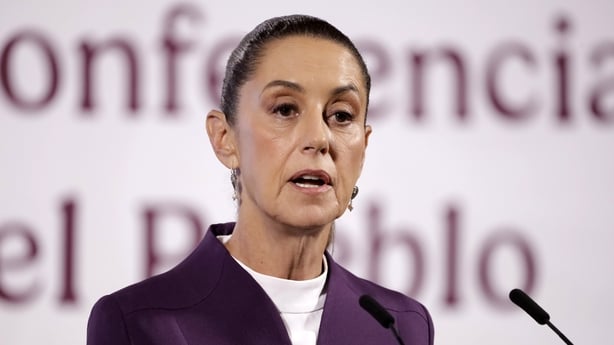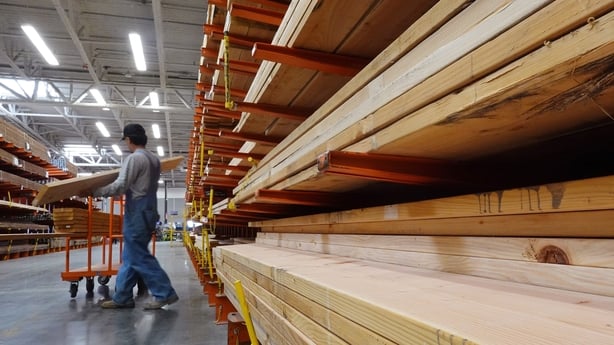Canadian Prime Minister Justin Trudeau has said that US President Donald Trump imposed tariffs on Canada to destroy the country's economy to make it easier for the United States to annex its northern neighbour.
The warning about Mr Trump's threat to Canadian sovereignty came as the US president delivered on his vow to impose 25% tariffs on all Canadian goods.
Canada immediately retaliated with 25% tariffs on C$30 billion of US imports, triggering a trade war between previously close allies and threatening future commerce across a border that regularly sees billions of dollars in daily trade.
If the US tariffs persist, Canada will impose a 25% tariff on a further C$125 billion of US imports in 21 days' time, Mr Trudeau said.
Mr Trump has said the tariffs are necessary to force Canadian action against what he describes as the flow of undocumented migrants and the drug fentanyl across the border.
Mr Trudeau has maintained that Canada is not a significant contributor to either problem in the United States and called Donald Trump's fentanyl justification "completely false".
Asked about Mr Trump's motivations for imposing tariffs, Mr Trudeau said the US president, who has spoken often of making Canada the 51st American state, "wants to see a collapse of the Canadian economy because that would make it easier to annex us."
"The United States launched a trade war against Canada," Mr Trudeau said.
Canadians brace for tariffs
"Canadians are reasonable. We are polite. We will not back down from a fight."
Addressing Mr Trump directly, Mr Trudeau said that while he thinks Donald Trump is a "smart guy," the tariffs are a "very dumb thing to do".
Mr Trudeau, who has been in power since 2015, is due to be replaced as the leader of the governing Liberal Party on Sunday.
He has said he will step down as prime minister as soon as the party's new leader is chosen.
Mr Trudeau has publicly tried to address Mr Trump's concerns on migrants and fentanyl, in hopes of avoiding the tariffs.
Canada has pushed through a costly new border security plan and named a fentanyl czar to lead the effort against the killer in opioid.
Mr Trudeau said his focus remained on getting US tariffs lifted "as quickly as possible," adding that he remained ready to talk directly to Mr Trump.

All three countries hit with tariffs retaliate
Meanwhile, Mexican President Claudia Sheinbaum said she would be laying out her country's response to the measures on Sunday.
Global markets fell sharply in response to the escalating trade war, with the S&P 500 - a major Wall Street index - extending recent losses to erase all of its gains since Mr Trump's US election victory in November.
Mr Trump had announced - and then paused - blanket 25% tariffs on imports from major trading partners Canada and Mexico in February, accusing them of failing to stop illegal immigration and drug trafficking.
He pushed ahead with them today, citing a lack of progress on both fronts.
Read More: US tariffs: What's been done and what is to come?
The sweeping duties will hit over $918 billion in US imports from both countries, affecting everything from avocados to the lumber crucial for building US homes, and hampering supply chains for key sectors like automobiles.
Mr Trump also inked an order yesterday to increase a previously imposed 10% tariff on China to 20% - piling atop existing levies on various Chinese goods.
China condemned the "unilateral imposition of tariffs by the US," filing a complaint with the World Trade Organization and threatening to impose 10 and 15% levies on a range of agricultural imports from the United States.

Analysts have warned that the higher import costs could push up prices for consumers, complicating efforts to bring down inflation.
That includes at grocery stores - Mexico supplied 63% of US vegetable imports and nearly half of US fruit and nut imports in 2023, according to the US Department of Agriculture.
Housing costs could also be hit. More than 70% of imports of two key materials homebuilders need - softwood lumber and gypsum - come from Canada and Mexico, said the National Association of Home Builders.
Truck drivers at the Otay Mesa border crossing in Mexico told AFP they were already feeling the impact as they waited to cross into the United States early Tuesday.
Work was drying up because many companies in the Mexican border city of Tijuana export Chinese goods, said driver Angel Cervantes.

China said its tariffs against the United States will come into effect next week and will impact tens of billions of dollars in imports, from soybeans to chickens.
It announced that all imports of US lumber have been suspended, and that soybean shipments from three American exporters have been halted, as country's foreign ministry vowed to fight the US trade war to the "bitter end."
European Union trade spokesman Olof Gill warned the tariffs on Canada and Mexico threatened transatlantic "economic stability" and risked disrupting global trade, urging Washington to reverse course.
The Tax Foundation estimates that before accounting for foreign retaliation, tariffs on Canada, Mexico and China this time would each cut US economic output by 0.1%.
"We could easily reach the highest effective tariff rate since 1936 by the beginning of 2026," KPMG chief economist Diane Swonk warned ahead of the tariffs going into effect.
Both consumers and manufacturers stand to bear the costs of additional tariffs, which could diminish demand and trigger layoffs as businesses try to keep costs under control, she said.

